|

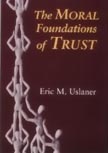
Translated into
Chinese and published by Cambridge University Press in collaboration with
Chinese Social Sciences!
|
|
|
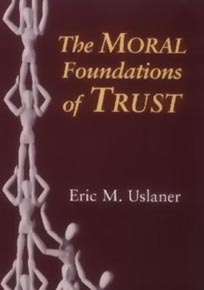
Generalized trust has declined in the United States from 58% in
1960 to 34% in 2003. The United States is a more conflictual
society. We argue more, volunteer less, and give less of our
income to charity. Both in the United States and across
nations, the most important factor shaping trust is economic
inequality.
The more
inequality, the less
trust.
My most widely cited work is The Moral Foundations
of Trust, published by Cambridge
University Press. Click here to order from
Cambridge University Press or from
amazon.com . On January 29, 2010 it was the subject
of the "Morning Feature" on
Daily Kos:
Morning
Feature: Are you a trusting soul? Probably, generally, but not
particularly
Wed Jul 28, 2010 at
04:26:04 AM PDT
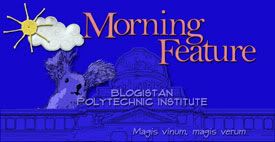 How
did you get to be such a trusting soul? How
did you get to be such a trusting soul?
What, you don't consider yourself the
trusting type? You're suspicious of everyone? Well, maybe,
in some cases. But I doubt it. Not compared to other folks
on the spectrum of politics and trust.
Odds are you have a basic, default
attitude of trust in other people. Why do I say that?
Because you're here. Because you're reading Daily Kos,
probably even logged in as registered participant. Because
you're probably not reading this while waving a
sign proclaiming that you want your country back from people
who aren't exactly like you.
(There's more below the fold)
The Moral Foundations of Trust,
by
Eric M. Uslaner
Because we're the sort of people who
read and participate at a Democratic political site, we
probably have a more generalized attitude of trust than a
typical tea party slogan shouter. Tea party participants
exhibit what Professor Eric Uslaner calls "particularized
trust", a trust that requires everyone to be just
like us. Having a more inclusive worldview correlates
strongly with a more generalized trust, the
sort of trust we can extend to people who differ from us.
More importantly, generalized trust also extends to
trust in the ability of government to be useful.
Eric Uslaner works as a professor
of government and politics at the University of Maryland. In
the 1990s he examined rising incivility among members of
Congress, reported in an earlier book, The Decline of
Comity in Congress (1993). His book, The Moral
Foundations of Trust, extends his research about the
role of trust in forming and maintaining functional
government. Although aimed at an audience of social science
scholars who want to see lots of data and statistics, it's
possible to extract a few intriguing notions from the text
even while skimming.
Regular readers of Morning Feature
may note the title's similarity to
Jonathan Haidt's work on moral
foundations. That turns out
to be a coincidence. Uslaner's book was published years
before Haidt's research results, and their concepts of moral
foundations differ. Uslaner's apparent goal is to
distinguish "moralistic trust" from "strategic
trust". Strategic trust is knowledge-based or
knowledge-derived, and often temporary. Strategic trust
results from a decision to trust someone to complete a
transaction or to perform a service. Selecting a plumber
from those reviewed at
Angie's List
would be an example. Strategic trust draws from the same
mental model as rational actors in economics. Apparently
strategic trust received more attention from Uslaner's
social science peers during the 1990s, but he wanted to
explore how trust relates to ethics, attitudes, and values,
some components of "moralistic trust".
After distinguishing moral trust
from strategic trust, Uslaner lays out his other key
distinction: "particularized trust"
compared to "generalized trust":
"Particularized trusters only
rely upon people they are sure share their own values.
Generalized trusters presume that most people
they meet share their values; particularized trusters
demand evidence that people outside their circles (or
identity groups) share their beliefs."
Flag pin, anybody?
Or more recently: Show us your
papers!
(We demand evidence that you share our beliefs.)
This isn't necessarily a new model,
of course. It relates to
in-group
and out-group behaviors long ago described by psychologists.
Uslaner even uses the terms in-group and out-group in his
descriptions. What struck me about particular trust is how
well it describes the vehement and venomous in-group and
out-group dynamics exhibited by tea partiers and the Arizona
state legislature. In practice, particularized trust looks
like paranoia strong suspicion of anyone who
hasn't yet proven they're just like me (Okay, and you, too.
But where's your flag pin?)
Here are a few other noteworthy
tidbits. Items not quoted are my paraphrases.
- Generalized trust declines as
income inequality increases. Trust in other people, our
fellow citizens, and trust in government have
disappeared along with income.
- "Young people with friends of
different race are less likely to be particularized
trusters."
(Again, this correlates with other psychology data, the
"exposure
effect".)
- "Highly educated people
(especially with college education) more likely to be
generalized trusters, less likely to be particularized
trusters."
- "Optimists are more likely to
be generalized trusters, less likely to be
particularlized trusters."
- Sense of control is a
predictor: "People who think that they can control their
lives are more likely to be generalized trusters and
less likely to be particularized trusters."
Do those data points begin to
describe worldviews we recognize? I think so. Although the
author emphasizes the politically neutral label, "optimist",
I found myself classifying various descriptions as liberal,
conservative, liberal, conservative, liberal, etc. The book
predates the current tea party phenomenon, and tea partier
behavior can be explained several different ways, of course.
But the concept of particularized trust seemed like a
perspective on tea party politics that might be timely and
valuable to share.
In the last chapters of Moral
Foundations of Trust, Uslaner describes ways that
interpersonal trust can and apparently do improve the
operation of government. That appears to be the basis of his
current research about the effects of
corruption
in government.
Uslaner's Moral Foundations of
Trust is nearly ten years old. The survey data
available to him, mostly from the 1980s and 1990s, also
limited the conclusions he could draw. Since then other
authors, such as
Lakoff,
Altameyer,
and
Haidt,
have published more up-to-date and more accessible writing
(for non-specialists) on morality, social psychology, and
politics. But the book seems useful as a data-dense social
science reference.
I found Uslaner's book on the
social psychology shelf at my library, where I was looking
for information about the ways we interpret signals to
assess trust or threat. This book didn't answer any of those
questions, so I'll keep looking.
Two closing thoughts, one from
Uslaner and one from some other guy:
"People who trust others don't
see differences in values as a call to arms. They are
tolerant of people unlike themselves. They see the
potential of mutual gains by working together....
Without generalized trust, you need to build strategic
trust time and time again."
Remember the policy called, "Trust,
but verify"? Is that really trust? It seems to me a very
particular kind of trust.
I trust that you've read
scrolled this far. Thanks for your kind attention. And
thanks for your generalized trust that at least some of our
fellow humans can re-establish healthy, mature democracy.
Cheers, and good morning, y'all
The book is a study of the moral foundations
of trust in other people, distinguishing between generalized
trust and particularized trust. I begin with an examination
of the standard view of trust, which holds that trust reflects
one’s life experience. I suggest both theoretical and empirical
reasons why this is an incomplete view of trust. The more
interesting and consequential parts of trust stem from looking
at the concept as a moral value. Generalized trust, as reflected
in the survey question, "Do you believe most people can be
trusted, or can’t you be too careful in dealing with people?"
expresses faith in strangers. Thus, it cannot be based on
experience. I show how generalized trust as a moral concept
affects a wide range of actions, from everyday life to working
in the community.
|
|
|
|
Trust
makes people more likely to endorse strong standards of
moral behavior and to be willing to pay more in taxes to
increase government spending (even though they generally
don’t favor more spending). Trusters are less likely to
say that you should obey a law without questioning it. Trusters
believe that the country has a common set of values and
that our educational system should be based on the classics.
Generalized
trusters believe that ethnic politicians should not
serve ethnic interests. Even controlling for their fear
of crime, trusters are less likely to lock their doors.
They are also less likely tocall in sick for work when they
are really well–and more likely to spend time helping relatives.
The roots of trust are in an optimistic world view. Trust
reflects this outlook more than it does real life economic
conditions. And trust has been in decline for over 30 years.
The roots of the decline in trust are traceable to declining
optimism and increasing economic inequality. I find support
for this by aggregate time series in the United States and
cross-sectional data across market economies.
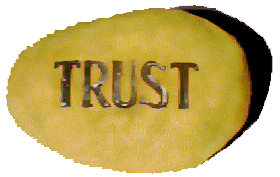 Chapter
1 introduces the manuscript. Chapter 2 lays out the difference
between strategic and moral trust. Chapter 3 takes care
of some measurement issues (including defending the trust
question against charges it doesn't measure what it purports
to) and also shows that trust is stable over time. Chapter
4 shows that moralistic (generalized) trust doesn't depend
upon experience, but on optimism and a sense of control
(and comes from one's parents). Chapter 5 examines
the purported linkages between informal socializing, membership
in civic associations, trust in government, and personal
experiences and trust in other people. In virtually
every case, both informal socializing and group membership
neither produce nor consume trust. The only types
of civic activities that are strongly related to trust are
volunteering and giving to charity, both of which link us
to people who are different from ourselves. Neither
trust in government nor trust in people we know leads to
generalized trust in strangers.
Chapter
6 focuses on how trust changes over time, both for individuals
and in the aggregate. As people become more optimistic,
they become more trusting. And in particular there
are powerful effects for two forms of "collective"
experiences, the civil rights movement (which increased
trust) and the war in Vietnam (which lowered trust among
opponents). Chapter
1 introduces the manuscript. Chapter 2 lays out the difference
between strategic and moral trust. Chapter 3 takes care
of some measurement issues (including defending the trust
question against charges it doesn't measure what it purports
to) and also shows that trust is stable over time. Chapter
4 shows that moralistic (generalized) trust doesn't depend
upon experience, but on optimism and a sense of control
(and comes from one's parents). Chapter 5 examines
the purported linkages between informal socializing, membership
in civic associations, trust in government, and personal
experiences and trust in other people. In virtually
every case, both informal socializing and group membership
neither produce nor consume trust. The only types
of civic activities that are strongly related to trust are
volunteering and giving to charity, both of which link us
to people who are different from ourselves. Neither
trust in government nor trust in people we know leads to
generalized trust in strangers.
Chapter
6 focuses on how trust changes over time, both for individuals
and in the aggregate. As people become more optimistic,
they become more trusting. And in particular there
are powerful effects for two forms of "collective"
experiences, the civil rights movement (which increased
trust) and the war in Vietnam (which lowered trust among
opponents).
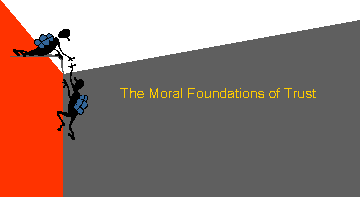
Overall, the biggest single factor that
has shaped the decline in trust in the United States is
the rise in economic inequality since the 1960s. As
inequality has risen, optimism has fallen, and so has trust.
Chapter 7 summarizes the consequences of trust. There
has been a general decline in many forms of civic engagement,
but most (especially informal socializing, group membership,
and political participation) are not linked to trust.
However, the decline in the share of our national income
going to charity (especially charity that benefits people
who are different from ourselves), the smaller number of
people volunteering for the Red Cross, and volunteer firefighters
are all linked to the decline in trust. Trusters are
more tolerant of people different from themselves and more
willing to support government programs to help people who
face discrimination. Chapter 8 is a cross-national
examination of trust. As in the United States over
time, the strongest determinant of trust cross-nationally
for countries without a legacy of Communism is the level
of economic equality. Countries with many trusters
also have better functioning governments, stronger economic
growth, and more open economies. They also pursue
policies that redistribute income from the rich to the poor.
The epilogue sums it up. And there is also a list of references.
Here is
what two leading academics, professor robert wuthnow of the
sociology department at princeton university, and professor
holli semetko (professor of audience and public opinion
research at the university of amsterdam) wrote about the
book on the back dust jacket:
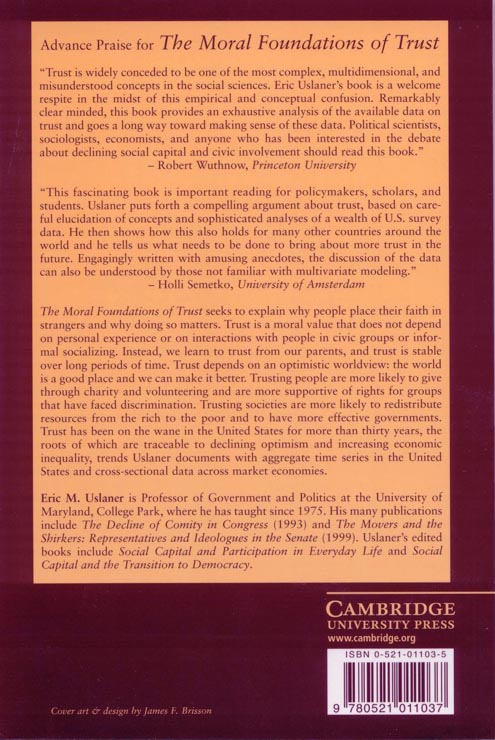
Here is what Professor Samantha Luks of the University of
Minnesota wrote about the book in the December 2003 issue of
Perspectives on Politics, 1:795-796:
The
Moral Foundations of Trust.
By Eric M. Uslaner.
Cambridge: Cambridge University Press, 2002. 298p. $65.00
cloth, $23.00 paper.
Samantha Luks,
University of Minnesota
In recent years, many scholars
have questioned how the decline of interpersonal trust has
affected American political life. Eric Uslaner adds to this
literature by explaining the causes of the decline of
generalized trust in America and the political importance of
having a trusting society.
One of the more important
contributions Uslaner makes to the study of trust is the
thorough distinction between "strategic trust" and
"moralistic trust." Many accounts in the trust literature
have focused on knowledge-based trust (e.g., Claus Offe’s
"Trust and Knowledge, Rules and Decisions: Exploring a
Difficult Conceptual Terrain," in Mark A. Warren, ed.,
Democracy and Trust, 1999). In other words, actor A
expects actor B to behave in a certain fashion because of
previous experiences withthat individual. In more extreme
versions of this theory (such as in Russell Hardin’s
Trust and Trustworthiness, 2002), one can develop trust
only on a one-by-one basis through specific interactions
with an individual and cannot generalize to a larger group
of people through his or her experiences.
Uslaner demonstrates that the
strategic account of trust can be problematic in studies of
social capital. For instance, Robert Putnam in Bowling
Alone (2000) asserts that participation in social
organizations can improve trust and that it is the secular
decline in participation that has led to reduced trust in
other people. However, Uslaner is quick to point out that
the kind of people one meets in these sorts of activities
are likely to be similar to oneself. How then do we learn to
trust people with whom we have nothing in common? Clearly,
such "trusters" exist, but their decision to trust people
in general cannot be based on a strategic calculation,
because people lack the necessary experience to make such an
evaluation (Hardin’s "Trusting Persons, Trusting
Institutions," in Richard J. Zeckhauser, ed., Strategy
and Choice [1991] makes a similar point about the
difficulties of strategically trusting the government).
It is here that the importance
of understanding moralistic trust emerges. Unlike strategic
trust, moralistic trust generally is not based on recent
experiences and does not require a calculation of risk.
Additionally, moralistic trust is not altered by a few bad
experiences with individuals; a single bad experience does
not destroy one’s faith in mankind. In fact, faith is a good
way to describe moralistic, or generalized, trust.
Generalized trusters trust a wide range of people, not just
people like themselves or who share their own values.
Furthermore, generalized trust exists in many contexts. As
Uslaner states, "A trusts, rather than A
trusts B to do X" (p. 27).
Despite the differences between
moralistic and strategic trust, both have experienced a
decline in recent decades. The question then is that if
generalized trust is unrelated to organizational
participation, what has caused its decline? Uslaner presents
two main foundations for moralistic trust: optimism and
economic equality. The two most important components of
optimism are the belief that the future will be better than
the past and that we as individuals can control our
environment. It is this type of faith that allows people to
overcome setbacks.
What is more provocative is the
connection Uslaner makes between economic inequality and the
decline of generalized trust in America. The perception that
one is worse off than others has contributed to the decline
of trust. While some perceptions of inequality do come from
television images of the extremely wealthy, most come from
viewing the world around oneself. When objectively measured
economic inequality is high, people are less likely to be
optimistic about their ability to overcome hardship through
hard work.
Through his analyses, Uslaner
directly challenges many arguments made by Putnam (2000).
For example, contrary to the picture of American small-town
life as communities of trusting citizens, people who live in
small towns are likely to be particularized trusters of
their own kind, but distrustful of strangers and outsiders.
Moreover, he shows that trust did not begin to erode with
the advent of the baby boom generation and the television
age. Rather, the early baby boom generation (born 1946 to
1955) is actually the most trusting, because this generation
has experienced the least economic inequality and is the
last generation to do better than the generation of its
parents.
Given that Uslaner focuses on a
different conception of trust than has been used previously,
it is important to address the question of why generalized
trust matters. He shows that generalized trusters are more
likely to hold a host of political attitudes many would
consider beneficial. They are more likely to give positive
evaluations of groups that have traditionally faced
discrimination and are more supportive of the legal order in
society. These types of attitudes translate into a greater
willingness to serve on juries and to contribute to causes
that help the less fortunate (he notes that particularized
trusters, while more participant in activities that may
benefit themselves, are not more likely to help the needy).
At the aggregate level, while declining trust has no
apparent relationship with civic engagement, it has hindered
collective action where a high level of cooperation between
disparate groups is required.
The scope of the arguments in
The Moral Foundations of Trust is impressive. Uslaner
consults a wide variety of survey data sources (regrettably,
some of these sources are somewhat dated) and uses a number
of statistical approaches in this pursuit. It is here that
the book would benefit from more explanation of the
reasoning behind the models and statistical techniques he
uses. For example, he does not explain why he imputes data
in Chapter 7 or the choice of the imputation method. More
seriously, because many of the findings rest on testing
causal ordering between variables through simultaneous
models (e.g., the relationships between trust and optimism
and between trust and volunteerism), Uslaner should have
devoted more time to how he developed and tested the
specifications of his models. These criticisms
notwithstanding, this book provides a careful treatment of
why we should consider generalized trust separately from
specific trust. It is a significant contribution to the
trust and social capital literatures.
And here is what Julia
Schafer and Stephanie Stuck of the University of Mannheim
wrote in Politische Vierteljahresschrift, 45: March
2004 (graciously translated by Helmut Lott of the University
of Maryland):
Eric M.
Uslaner. The Moral Foundations of Trust. Cambridge
University Press 2002, 297 p., $23 (paperback), $63
(hardcover).
“Trust is the chicken soup of social
life,” for trust has, just like chicken soup, many positive
effects but cannot solve every problem. This is Eric
Uslaner’s point of view in his book The Moral Foundations
of Trust. In his opinion generalized trust is general
openness based on basic moral convictions, collective
experiences, and optimistic attitudes regarding complete
strangers. Uslaner parts with many scholars of social
capital, as he believes that there is no connection between
generalized trust and social participation. Relying on a
variety of data sets he investigates the conditions and
consequences on the level of the individual as well as
comparative state level data.
Uslaner distinguishes between
knowledge-based strategic trust on one hand and moral trust
on the other. Strategic trust rests on information and
expectations. It relates to specific persons, develops
slowly with experience and is fragile. Moral trust, on the
other hand, represents a complete system of values that
children acquire from their parents and that changes
throughout life only little. It reflects a “general outlook
on human nature” (17) and includes the conviction that
complete strangers share basic values. Moral trust is
therefore the foundation of generalized trust. Particular
trust, on the other hand, rests on knowledge and is
different from generalized trust also through the smaller
sphere of one’s own “moral community” (21): while people
with particular trust only extend trust to a tightly defined
group of people (in-group) they meet outsiders generally
skeptically. Individuals with generalized trust evaluate
their in-group not substantially better than out-groups.
Uslaner explicitly foregoes the term
social capital but on balance this is a book that adds many
interesting aspects to the present social capital debate.
The clear distinction between strategic and moral trust
contributes to the necessary specification of the concept
trust. Furthermore one must emphasize the empirical
investigation of the causal relationship between trust and
participation. Uslaner documents his hypothesis that civil
engagement does not lead to more trust in strangers. He
explains the American decline in trust since the sixties
with generational effects. Unlike the proponents of the
social capital theory he emphasizes not the importance of
social participation but collective experiences such as the
civil rights movement and the Vietnam War. Uslaner’s
analysis furthermore reveals that tolerance and social
equality are important for a society’s level of trust.
Uslaner also confirms the notion that generalized trust
reflects the general attitude about strangers because
fundamental optimism proves to be a key factor for
generalized trust. Especially the treatment of optimism as
a moral conviction as product of socialization is an
interesting addition to the social capital models.
The Moral Foundations of Trust
is enriching reading for interested lay readers as well as
expert researchers. The book’s style is stimulating
supplementing data and arguments with anecdotes from
Uslaner’s personal experience. The fact that Uslaner places
data analysis in footnotes facilitates considerable
empirical analysis while preserving good readability. On
the other hand, occasionally it is not possible to entirely
understand his data analysis because the composition of the
indicators or the type of the statistical model is unclear.
Terms such as “faith,” “interpersonal trust,” “generalized
trust” or “trust” without informing the reader of the
(apparently) synonymous use (see page 56, for example) are
confusing.
In summary, Uslaner goes beyond the
known hypotheses and simple correlations regarding the
relevance of trust for the workings of democratic societies
and attempts to question the conventional wisdom of the
debate theoretically as well as empirically. He raises not
only questions about many assumptions of the social capital
debate but provides stimulating and innovative theses that
enliven the debate. Therefore Eric Uslaner’s The Moral
Foundations of Trust may well turn out to be chicken
soup for the debate about social capital.
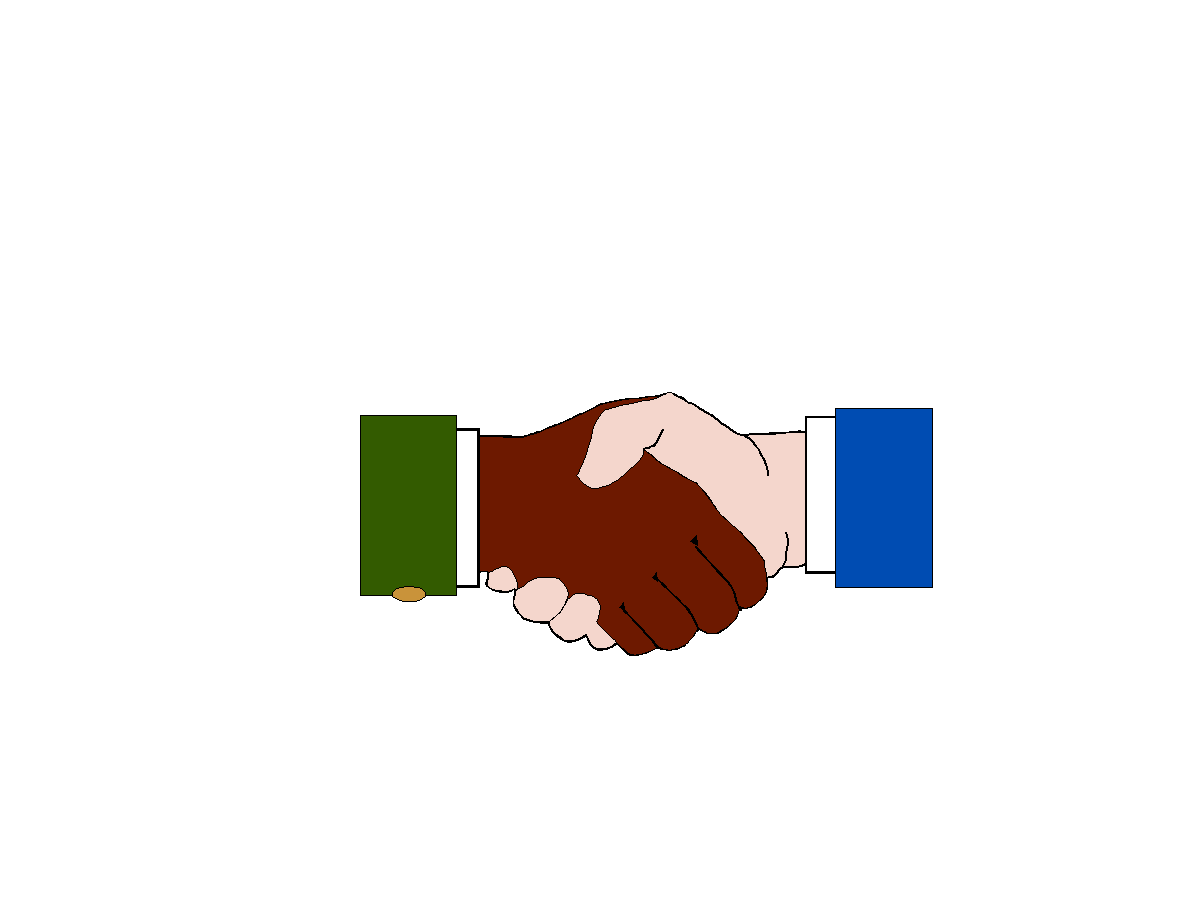
|
| Download
the full manuscript or individual chapters in either Adobe
Acrobat or WordPerfect format. See the discussion of my findings
on trust in the Washington Post's "Unconventional
Wisdom" column of June 27, 1999 or download a non-technical
summary of the findings in my paper, "Trust and Consequences"
delivered at the Communitarian Summit, Arlington, VA, February,
1999 (pdf
version, WordPerfect
version). |
| Comments
are most welcome!
You
need the Adobe Acrobat reader to read or print Adobe files.
You can download it for free by clicking here.
This is
a revised edition of the book, revised as of July, 2000.
|
|
|
 How
did you get to be such a trusting soul?
How
did you get to be such a trusting soul?



 Chapter
1 introduces the manuscript. Chapter 2 lays out the difference
between strategic and moral trust. Chapter 3 takes care
of some measurement issues (including defending the trust
question against charges it doesn't measure what it purports
to) and also shows that trust is stable over time. Chapter
4 shows that moralistic (generalized) trust doesn't depend
upon experience, but on optimism and a sense of control
(and comes from one's parents). Chapter 5 examines
the purported linkages between informal socializing, membership
in civic associations, trust in government, and personal
experiences and trust in other people. In virtually
every case, both informal socializing and group membership
neither produce nor consume trust. The only types
of civic activities that are strongly related to trust are
volunteering and giving to charity, both of which link us
to people who are different from ourselves. Neither
trust in government nor trust in people we know leads to
generalized trust in strangers.
Chapter
6 focuses on how trust changes over time, both for individuals
and in the aggregate. As people become more optimistic,
they become more trusting. And in particular there
are powerful effects for two forms of "collective"
experiences, the civil rights movement (which increased
trust) and the war in Vietnam (which lowered trust among
opponents).
Chapter
1 introduces the manuscript. Chapter 2 lays out the difference
between strategic and moral trust. Chapter 3 takes care
of some measurement issues (including defending the trust
question against charges it doesn't measure what it purports
to) and also shows that trust is stable over time. Chapter
4 shows that moralistic (generalized) trust doesn't depend
upon experience, but on optimism and a sense of control
(and comes from one's parents). Chapter 5 examines
the purported linkages between informal socializing, membership
in civic associations, trust in government, and personal
experiences and trust in other people. In virtually
every case, both informal socializing and group membership
neither produce nor consume trust. The only types
of civic activities that are strongly related to trust are
volunteering and giving to charity, both of which link us
to people who are different from ourselves. Neither
trust in government nor trust in people we know leads to
generalized trust in strangers.
Chapter
6 focuses on how trust changes over time, both for individuals
and in the aggregate. As people become more optimistic,
they become more trusting. And in particular there
are powerful effects for two forms of "collective"
experiences, the civil rights movement (which increased
trust) and the war in Vietnam (which lowered trust among
opponents). 


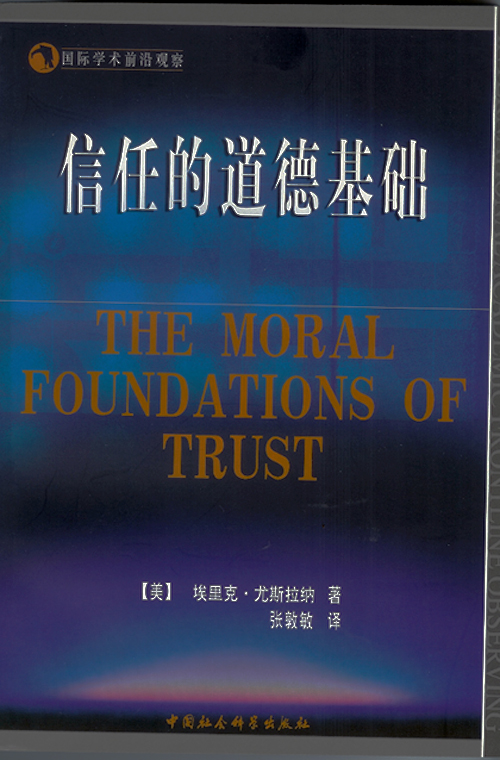
 Chinese
and Korean edition covers!
Chinese
and Korean edition covers!